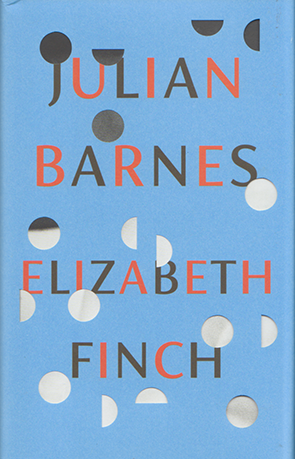Reading Julian Barnes’s Elizabeth Finch was a fascinating and immersive experience for me. Yet as I read it I was aware that this is not a book that is going to please all readers. Not everyone who opens a book is looking for the same experience, or without prior conceptions, are necessarily open to what they receive. It’s a similar point to that made by the eponymous Elizabeth Finch on the opening page: “For some of you, I may well not be the best teacher, in the sense of the one most suited to your temperament and cast of mind.” As a university lecturer, Elizabeth Finch refuses to coddle students with what she describes as, “milksop encouragement and bland approval”. She is adamant that the best form of education is not driven by reading lists and examinations, but is rather a collaborative experience, based upon the Socratic tradition of the Greeks. Elizabeth Finch has her detractors, as much as Neil, our narrator, might wish to ignore or dismiss the voice of other students like Geoff, who is openly critical of Elizabeth Finch’s methods and point of view. But given the characterisation of Elizabeth Finch (or EF as Neil often calls her) we, as readers, understand that this is what she would expect, given her belief in pluralism and her ardent refusal to indulge in self-pity.
Elizabeth Finch is not a traditional narrative. One might characterise it as a psychological novel, as a thinly disguised academic essay or even a quest. It is psychological because we are privy to the inner thoughts and feelings of Neil as he tries to piece together an understanding of his former teacher. His compulsion to understand EF is also revealing about him. We are acutely aware that Neil has fallen for Elizabeth on some level. While she remains stoically – proudly – a “spinster”, he struggles to resolve his latent romantic, perhaps sexual feelings for her. He is slow to acknowledge her faults, and his feelings make him blind to the valid criticisms that others like Geoff voice about EF, as well as blind to the impact his infatuation has on his relationships with other women like Anna and Linda, members of his former class.
The thought that this novel is a thinly disguised essay is something I say without criticism, but acknowledge that this aspect of the novel will not appeal to many readers. Barnes attempted something similar with his A History of the World in 10½ Chapters, published in 1989, which is a collection of interrelated short stories and essays which concern themselves with the nature of history. Elizabeth Finch is a somewhat more coherent reading experience, with a more developed plot and characters. Yet novel is divided in three parts and the second part has almost nothing to say about EF at all, at least directly, and doesn’t progress the main plot (to the extent that there is a plot). Instead, it represents an essay that Neil writes based upon his research of Julian the Apostate, the last pagan Roman emperor, along with some material on St Ursula, a Christian martyr. Elizabeth’s course has introduced Neil and her students to the subject, and it has resonated with him. He maintains a formal lunch arrangement with her for years after the course is finished, and his research is an attempt to better understand the concepts she espoused, but also to better understand EF, herself, and make sense of her papers. It is in this sense that the novel is also a quest, because Neil follows EF’s thinking and her notes down a historical rabbit hole, ranging across many sources, from Edward Gibbon, Montaigne, Milton, Voltaire, Anatole France and even Hitler. We learn that Henrik Ibsen wrote what is possibly an un-performable play about the emperor Julian: Emperor and Galilean. What Neil is doing is attempting to reconstruct the ideological basis of EF’s thinking.
This is an aspect of the book that will potentially alienate some readers, depending on their personal beliefs. Emperor Julian, for some part of history, at least, has been villainised by the church. He renounced his Christian upbringing – hence the appellation ‘apostate’ – and used soft power against Christian doctrine to try to undermine its hegemony within the state. Central to EF’s personal beliefs is a strident rejection of monolithic doctrines: of monocultures and monotheistic religion. As a pagan emperor, Julian relied upon ritual sacrifice of animals and believed in a panoply of gods as did his forbears. EF’s position – at least as we understand it through the lens of Neil’s writing, is sympathetic to aspects of paganism, but the real issue lies with the historical legacy of Christianity: a key question is what would have happened had Julian not suffered an early death and polytheism had endured:
And what if the policy was pursued by his successors down the centuries? What then? Perhaps no need for a Renaissance, since the old Greaco-Roman ways would be intact, and the great scholarly libraries undestroyed. Perhaps no need for an Enlightenment, because much of it would already have happened. The age-long moral and social distortions imposed by a vastly powerful state religion would have been avoided.
Neil’s assessment of Christianity’s legacy may be too much of a sticking point for some readers to get past, because Barnes devotes a third of the novel almost exclusively to the topic of Julian the Apostate and Christianity’s impact on Western culture. But I think that there are other takeaways here that should encourage readers who are reticent. Neil’s is a point of view, and a rather biased one at that. Geoff, for instance, characterises EF’s teaching as “untouched by modern thought”, and while EF knew a lot, judges her to have been “self-indulgent” and an “amateur”. Neil’s judgment is further called into question by his misreading of personal relationships, not only with his former course mates, but with his two former wives and daughter. At the heart of this novel is the problem of how to construct credible, cogent narratives – biographical and historical – and whether that is even possible. “Getting its history wrong is part of being a nation” Neil quotes Ernest Renan, a nineteenth-century French historian as having said. Neil understands this to mean that a nation, in order to attain a cohesive identity and maintain unity, must engage in its own myth making, necessarily getting details wrong or indulging in fantasies: “of racial and cultural superiority. Belief in benign monarchy, infallible popes, and honest government.”
What this gets us to is the postmodern dilemma of authenticity and identity. If nations and religions can engage in this kind of myth-making, then so, too, can individuals. It is Elizabeth Finch who encourages critical thinking in her students by raising the problem of monolithic doctrines and thought. Yet EF never publishes her thoughts and her one foray into public lecturing is a disaster from which she resiles. She is always reticent. EF reiterates that reputation – that construction of the self by others – is entirely out of the power of anyone, and therefore a concern she does not indulge in. It is Neil who engages with the Quixotic attempt to construct a version of Elizabeth Finch that conforms to his idealisation of her; who, having completed his essay on Julian finds he must amend a series of mistakes he has made.
The narrative, itself, reflects this multifaceted and problematic construction. Composed partly as traditional narrative, as essay and historical research, interspersed with notes by EF and Neil, as well as quotations from poets, historians and philosophers, Barnes’s novel is a pastiche of memories, knowledge, media and academia that somehow forms an impression of Elizabeth Finch, even if her own thoughts about her life – about her unmarried state or childlessness, for instance – remain elliptical. To this end, the discussion about Christianity and paganism, for those who might be turned off by it, are not the whole story, I think. Geoff says of EF, “She struck me not so much as old-school as antique school.” Elizabeth Finch represents, as much as anything else, a panacea against modernism and our ways of thinking: against instinctive judgements based on shallow understandings encouraged by social forces shaped by modern media: “This was a time,” Neil tells us, “before laptops in class and social media out of it; when news came from newspapers and knowledge came from books.” Neil believes EF dealt in truth that transcended historical context, and it is from this that we perceive an important aspect of Barnes’s novel: that it acts like a parable; it shows us how problematic and difficult knowledge can be, not to mention its uses and misuses; that it is not one thing or point of view. Julian, Neil tells us, was baffled by Christianity’s idolising of martyrdom – the fanaticism – and their “sheer lack of sophistication, its refusal to acknowledge experts, its preference for lauding the fool and the simpleton over the scribe and wise man.” This, to me, sounds like an observation of modern society and the challenges presented by social media and computers which are predated by EF. At least, that’s one way to read the novel. The fact is, others are going to find entirely different takeaways from this novel which may even starkly contrast what I have to say about it. But that’s part of the point too. That knowledge, belief and culture should not be monolithic, which may be deleterious to thought.
This is a great novel if you’re in the mood for thought provoking narrative, and maybe even in the mood to learn a little bit about history. I enjoyed it. I think many might. But I also know this is not the right book for some.

 RSS Feed
RSS Feed Facebook
Facebook Instagram
Instagram YouTube
YouTube Subscribe to our Newsletter
Subscribe to our Newsletter





No one has commented yet. Be the first!